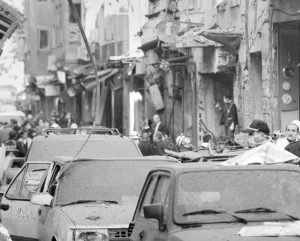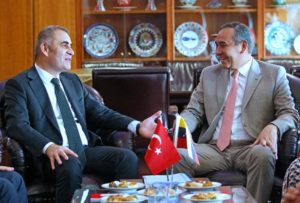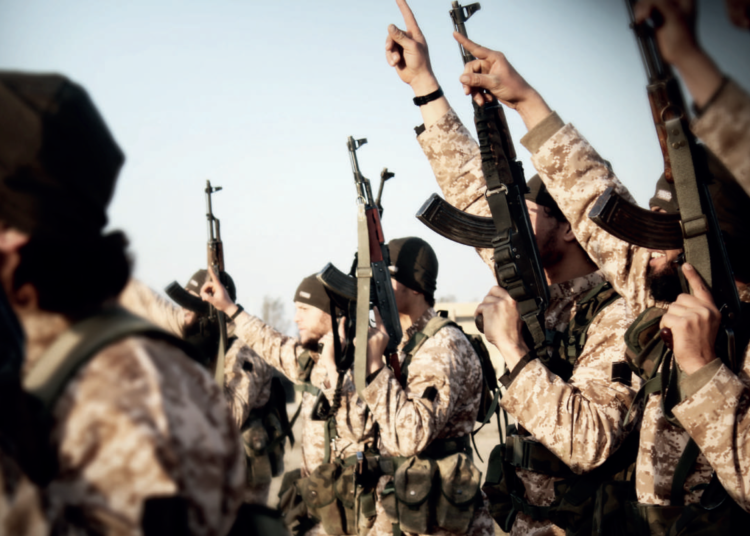Abdullah Bozkurt/Stockholm
A judge at Turkey’s highest court hushed up a criminal investigation into an al-Qaeda group that sent fighters to Afghanistan and Syria when he was deputy chief public prosecutor in Istanbul in 2014, documents obtained by Nordic Monitor have revealed.
İrfan Fidan, a newly appointed judge at the Constitutional Court, helped quash an investigation into an al-Qaeda Turkish group in 2014 when he was a deputy prosecutor at the Istanbul Chief Public Prosecutor’s Office. Fidan was hand-picked by Turkish President Recep Tayyip Erdoğan as his pointman in the prosecutor’s office, which has been pursuing abusive criminal probes against critics and opponents for years while hushing up investigations into radical Islamist groups as well as Erdoğan’s family members and his business and political associates.
Before Fidan’s arrival, the prosecutor’s office had launched a counterterrorism probe into an ultraconservative Salafist group that was active in several districts of Istanbul after police intelligence on May 24, 2011 reported increased activity, growing chatter and networking among group members. Al-Qaeda recruited many Salafists as jihadists, and Turkish authorities were monitoring such groups as part of counterterrorism surveillance.
The investigation into al-Qaeda identified about three dozen jihadists in Istanbul’s Küçükçekmece district:
The Salafist cells were clustered in Küçükçekmece, Bağcılar, Avcılar and Başakşehir, according to the intelligence report. They were led by Turkish nationals Ömer Öztürk, Abdurrahman Hasar, Dinçer Durmuş and Nurettin Muslihan.
The cell in Küçükçekmece became a major concern for law enforcement given the fact that Öztürk, the cell leader, was a battle-hardened man who had fought in Afghanistan in the past. He was also wanted by authorities on multiple charges for his involvement in the 2003 bombings in İstanbul of two synagogues, an HSBC branch and the British Consulate General that killed dozens of people.
The attack was claimed by al-Qaeda and its Turkish affiliate the Islamic Great East Raiders Front (İBDA/C). Öztürk was convicted and sentenced at the end of his trial, and an arrest warrant was issued for him. He fled the country to escape prison time. In March 2010 he was captured in the mountainous region of Waziristan in Pakistan close to the Afghan border, deported to Turkey and arrested on al-Qaeda membership as soon as he arrived at the airport.
In his absence Yücel Esen, another Turkish national, took over leadership of the Salafist cell and started reorganizing the group. Police intelligence discovered that the cell not only continued sending Turkish fighters to Afghanistan but also funneled cash for the jihadist campaign abroad.

The investigation was expanded further to include surveillance of more targets that were linked to the Küçükçekmece cell. With authorization from the Istanbul Chief Public Prosecutor’s Office, police launched probes into cell leader Esen and 14 other suspects identified as Şükrü Çiçek, Yusuf Çakırca, Nebi Özen, Arif Gökhan Şentürk, Ali Abdullah Öztürk, Emre Esen, Talha Güneş, Hatice Açku, Orhan Duman, Mustafa Çatır, Dinçer Durmuş, Resul Işık, Arif Kandil and Nazım Söylemez. Two men identified only by their first or assumed names, Cafer and Erkam, were also included in the probe.
The Istanbul prosecutor’s office assigned investigation case file No.2011/1070 to the probe, turning it into a judicial probe that would have paved the way for an indictment and trial. The police obtained wiretap and surveillance authorizations from court for 36 suspects in total, collected evidence and started to dig further.
As the investigation deepened, more names were uncovered as being linked to the cell. Two more people, Dilshod Sultanov and Ertuğrul Gültekin, were found to have been operating with the group. With the start of the Syrian crisis, the police found that the cell started to shift its focus to Syria, sending fighters there instead of Afghanistan and Pakistan. A police intelligence report dated November 2, 2013 indicated that Abdulvahap Çift, Selçuk Con, Mustafa Talha Buğdaycı, Ahmet Kardaş and Ferat Serder planned to go to Syria in order to fight on the side of al-Qaeda.
Document signed by İrfan Fidan, a former prosecutor and now a judge at the Constitutional Court, reveals that an investigation into al-Qaeda in Istanbul was quashed:
In another intelligence report on November 14, 2013, police said Erol Acar and Nusrettin Baykuşak ran logistics for al-Qaeda and helped wounded fighters obtain treatment and accommodation in Turkey. The report, dated November 18, 2013, showed that the group sent a Turk named Murat Sarıgül to Syria through illegal means.
According to police records, Çiçek took over leadership of the Küçükçekmece group on December 17, 2013.
The investigation into al-Qaeda was dealt a heavy blow when December 2013 corruption cases about bribery in Iran sanctions evasion schemes incriminated then-Prime Minister Erdoğan, his family members and his business and political associates. Erdoğan launched a major shakeup in the police and judiciary, reassigning investigators who were looking into graft as well as al-Qaeda and other radical Islamist groups.
The newly appointed prosecutors and police chiefs killed the corruption probes and suspended all ongoing investigations into al-Qaeda groups. The 2011 probe into the Küçükçekmece Salafist cell was among the causalities of Erdoğan’s vicious campaign to kill any and all investigations that he thought would harm his own agenda for Turkey.
In the end the investigation into al-Qaeda was dropped. A document signed by Fidan on March 18, 2015, a copy of which was obtained by Nordic Monitor, indicated that the prosecutor’s office decided to discontinue investigation No.2011/1070, killing the monitoring and surveillance of the al-Qaeda suspects. The document’s postscript showed that the investigators collected evidence in five folders about the group and that the evidence was trashed as well.

Fidan was rewarded for his services by President Erdoğan, who made him the Istanbul chief public prosecutor. In November 2020 he was assigned to a post at the Supreme Court of Appeals (Yargıtay), and within few days he was nominated for a judgeship at the Constitutional Court. Although he hadn’t even settled into his office at the appeals court, Erdoğan had him selected to be a judge at the country’s highest court on January 23, 2021.
As chief prosecutor, Fidan conducted investigations that led to the mass arrest of tens of thousands of people who are alleged to have been linked to the opposition Gülen movement, a group that is highly critical of the Erdoğan government on a range of issues from pervasive corruption to Turkey’s aiding and abetting of radical jihadist groups. He also hushed up a multi-year confidential investigation into clandestine Quds Force activities in Turkey.
Prominent novelist and journalist Ahmet Altan and businessman and human rights defender Osman Kavala were among those who were prosecuted by Fidan on fabricated criminal charges.












